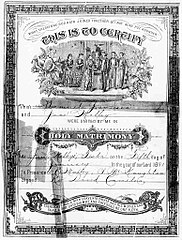
“What’s in a name?” Juliet asked. “A rose by any other name would smell as sweet.”
William Shakespeare put these words into Juliet Capulet’s mouth, to show that her love for Romeo was not restricted by his membership in the Montague family. The label of his name was immaterial to her, but, tragically, it would be to both their families.
Surnames became the norm in England with the Norman invasion. By the time Shakespeare’s Romeo & Juliet was performed in 1597, they were an integral part of a person’s identity.

My wedding anniversary is next month, and as I looked for an appropriate greeting card to mark the day, I remembered the discussions my husband and I had about what our new surname would be. I was in favor of keeping the separate names we already had, primarily because I didn’t want to go through the necessary paperwork to change all my legal documents and I had a professional identity . He thought it was important that we share our names as well as our lives. In fact, he was willing to adopt my name. Eventually, we decided to hyphenate, which has worked well for us.
People respond to our hyphenated names in various ways. Some select which surname to use and drop the other one. Curiously, those folks usually get their name of choice backward from the original one. My students managed to address me by my full hyphenated name, but were surprised my husband had the same name. And bureaucrats find the name so challenging, I begin by saying “My last name is Wagner-hyphen-Wright.”

In the United States today, 20-30 percent of brides choose to keep their own name. Sometimes they take their husband’s name for legal purposes and retain the use of their own for professional reasons. Apparently, older women with more education are more likely to keep their birth names.
Among the reasons woman decides to take her husband’s name is to demonstrate her complete commitment to the marriage, arguing that if a couple share their life and property, sharing a name publicly demonstrates they are one unit.

Public perception supports this view. In general, people view a woman who keeps her own name as the dominant partner in a relationship, and often perceive her partner as under her control. The perception that the woman and man are in an equal partnership doesn’t seem to be making any substantive headway, a fact I find disturbing.
Historically, surnames were not an issue. In Medieval England, most people were only known by their “Christian” name. But in the 9th century, bureaucrats began to consider who belonged to whom. The doctrine of coverture made the wife a meme covert, the covered woman. A wife became one with her husband with the same surname and no legal identity apart from him.

In the United States, a woman did not gain the right to her own passport, or driver’s license until the 1970s. In 1920, women gained the right to vote, but a woman could not register to vote unless she used her husband’s name. Women gained separate citizenship rights in 1922. Prior to that, a woman’s citizenship followed her husband’s status.
In 1975, the Tennessee Supreme Court ruled that a woman is not required to take her husband’s last name. In the words of Justice Joseph W. Henry, a woman “may elect to retain her own surname or she may adopt the surname of her husband. The choice is hers.”
At the other end of the spectrum, some countries do not allow women to change their names upon marriage. For example,

- Since the 1789 French Revolution, a French citizen is not allowed to adopt a name not on her birth certificate. She may use a spousal name, but cannot legally change it.
- Since 1975, Italian women are unable to change their name, though they can add their husband’s name.
- In 1981, Greece and Quebec made it a requirement for wives to retain their birth name.
- In Spain and Iceland, women customarily keep their birth names.
- Likewise, in Belgium a woman’s surname doesn’t change after marriage.
As it turns out, for those who have the choice, a surname reflects the identity of the people involved. Among the over 16,000 readers who responded to a New York Times article on why women kept or changed their surnames upon marriage, Katherine Yuk of Toronto shared that as a child, she was teased mercilessly about her name. But when she married, she decided to keep it, because she didn’t want to lose her identity. In contrast, Susie Houghton changed her name, because taking her husband’s name strengthened their bond.
👩❤️👨 👩❤️👨 👩❤️👨
Illustrations
Juliet on the Balcony by Thomas Francis Dicksee, 1875.
1881 Marriage Certificate.
Bride Holds Wedding Bands by Petr Ovralov.
Marriage of Philip II, Duke of Burgundy, & Margaret III of Flanders. 14th century.
Photo of American passport by Tony Webster.
Romantic Picture. Attribution: epSos.de
Kimberly A. Hamlin. “After Dobbs, Married Women Keeping Their Surname Regains Political Meaning.” Washington Post. June 28, 2022.
Hannah Ingber. “‘I Didn’t Want to Lose My Identity’: 16,000 Readers Reflect on Their Surnames.” New York Times. Dec 24, 2016.
Pamela Lytra. “To Change or Not to Change? A Greek Take on Women’s Names After Marriage.” Greek Reporter. Nov. 10, 2013.
Kristen Rogers. “Why Women Do or Don’t Change Their Name When They Get Married.” CNN. July 19, 2022.

Sandra Wagner-Wright holds the doctoral degree in history and taught women’s and global history at the University of Hawai`i. Sandra travels for her research, most recently to Salem, Massachusetts, the setting of her new Salem Stories series. She also enjoys traveling for new experiences. Recent trips include Antarctica and a river cruise on the Rhine from Amsterdam to Basel.
Sandra particularly likes writing about strong women who make a difference. She lives in Hilo, Hawai`i with her family and writes a blog relating to history, travel, and the idiosyncrasies of life.

